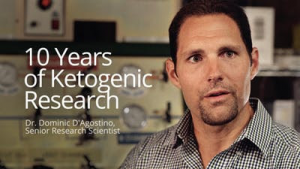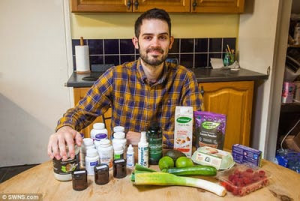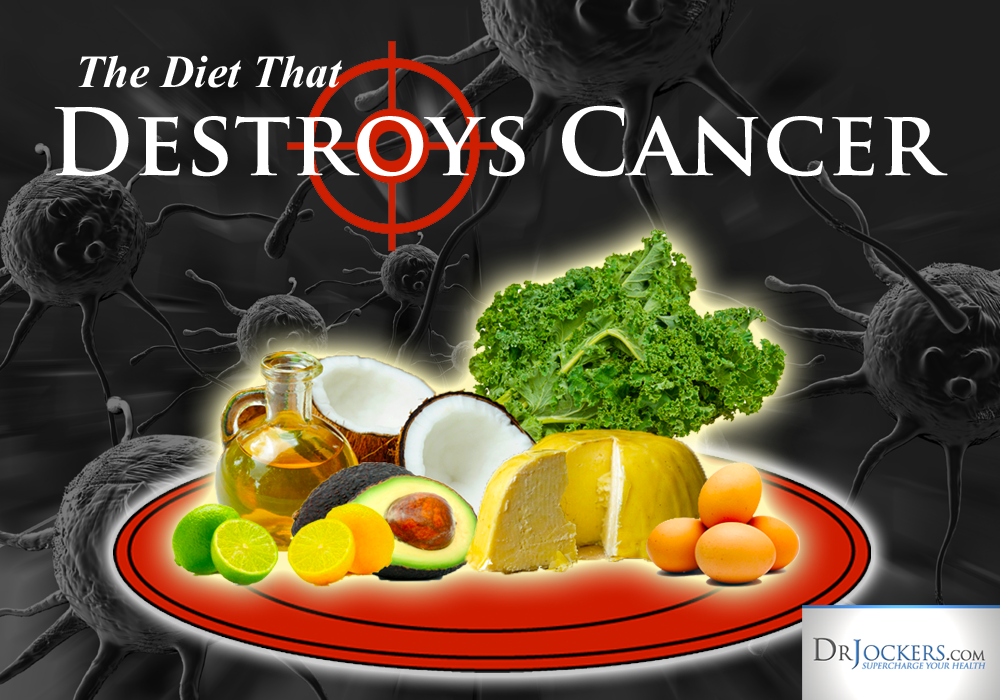 https://drjockers.com/diet-destroys-cancer/
https://drjockers.com/diet-destroys-cancer/
. Will the ketogenic diet help?
August 27, 2017by Ketooncologist
Jocelyn Tan M.D.
Keto Oncologist
I am a practicing US medical oncologist based in Pennsylvania. My work is at the Veterans Affairs Medical Center. I am also a faculty member at the University of Pittsburgh School of Medicine. I see adult patients with cancer and help them decide on the best option for their treatment. My time is spent on researching the ketogenic diets and cancer, while blogging and doing some academic writing.
I do believe in the power of chemotherapy but also feel that nutrition can play a big role in helping your cancer treatment. I encourage people to access the latest medical information and to help them recognize the credible ones.
Dear Dr. Tan,
Help! My dad was recently diagnosed with brain cancer . It is called a glioblastoma. I was told he has some options but the prognosis isn’t good regardless of what he does. I was researching on ketogenic diets and found your trial on clinical trials.gov.
I am sorry to hear about your dad’s glioblastoma diagnosis. Brain cancer comes in different forms, and grades. The glioblastoma type (also known as grade 4 astrocytoma) is unfortunately the most aggressive type of brain tumor. It is difficult to remove completely by surgery, and relapses early even with aggressive treatment (chemotherapy and radiation).
Compared to tumors from other organs, the brain appears to be highly dependent on carbohydrates as a source of energy. The ketogenic diet limits carbohydrates is already being used as a treatment for seizures. It also happens to be very effective. Studies however are only beginning to emerge in human brain cancer.
We still don’t have any substantial evidence of effectiveness in humans. However, there is emerging evidence based on scientific work on animal experiments and in the laboratory. Read More:
Health Impact News:
Some of the most exciting research regarding the ketogenic diet has been in its use against cancer. This research is showing that a high-fat low-carbohydrate diet can starve cancer cells. We published several stories on the ketogenic diet and cancer in 2013.
In this study conducted at the University of Pittsburgh Medical Center, the ketogenic diet was used successfully to treat brain tumors.
The Restricted Ketogenic Diet: An Alternative Treatment Strategy for Glioblastoma Multiforme a report by Thomas N. Seyfried, Purna Mukherjee, Miriam Kalamian and Giulio Zuccoli
Biology Department, Boston College; Dietary Therapies, LLC, Hamilton; Radiology Department University of Pittsburgh Medical Center, Children’s Hospital of Pittsburgh, Pittsburgh
Excerpts:
Glioblastoma multiforme (GBM) is considered the most malignant of primary brain cancers with only about 12% of patients living beyond 36 months (long-term survivors).
Ketogenic Diet and Calorie Restriction (omega 3 and cancer metastatic.)
The high fat, low carbohydrate ketogenic diet (KD) has long been recognized as an effective non-toxic therapy for reducing epileptic seizures in children. The mechanisms by which the KD manages seizures are linked to shifts in brain energy metabolism. Glucose is the sole metabolic fuel used for nearly all brain functions under normal physiological conditions, but the brain will metabolize ketone bodies for energy when access to glucose is limited, as would occur during water-only therapeutic fasting in humans or during calorie restriction in mice. It has long been known that water-only fasting or calorie restriction is effective in managing epilepsy in humans and mice.
The KD was introduced as an alternative to fasting for the long-term management of seizures in humans. The efficacy of the classic KD is optimal when the ratio of dietary fats to combined carbohydrate/protein is 4:1. This requires careful attention to diet calculations. Importantly, the KD is also gaining recognition as a potential therapy for a host of other neurological and neurodegenerative diseases including Alzheimer’s disease, Parkinson’s disease, traumatic brain injury, and stroke. When administered in restricted amounts, which do not exceed the individual’s total energy needs, the KD can also be therapeutic against malignant brain tumors in mice and humans.
Evidence from Case Reports
In 1995, Nebeling and coworkers attempted the first nutritional metabolic therapy for human malignant brain cancer using the ketogenic diet. The objective of the study was to shift the prime substrate for energy metabolism from glucose to ketone bodies in order to disrupt tumor metabolism while maintaining the nutritional status of patients. The patients in this landmark clinical study included two female children with nonresectable advanced stage brain tumors (anaplastic astrocytoma stage IV, and cerebellar astrocytoma stage III). Measurable tumor remained in both subjects following extensive radiation and chemotherapy. Although severe life threatening adverse effects occurred from the radiation and chemotherapy, both children responded remarkably well to the KD and experienced long-term tumor management without further chemo or radiation therapy. Indeed, one of the patients remains alive at the time of this writing (Nebeling, personal communication). Positron Emission Tomography with fluro-deoxy-glucose (FDG-PET) also showed a 21.8% reduction in glucose uptake at the tumor site in both subjects on the KD. These findings indicate that a ketogenic diet, which lowers glucose and elevates ketone bodies, could reduce glycolytic energy metabolism in these brain tumors.
Despite the documented efficacy of the RKD as a non-toxic metabolic therapy for brain cancer in case reports, no major clinical trials of this therapy have been initiated in the US to date. A clinical trial using the unrestricted KD for recurrent glioblastoma has been initiated in Germany (ERGO Trial) under the direction of J. Rieger at the University of Tübingen. Modest improvement was reported without adverse effects, but no published information is yet available on blood glucose or blood ketone levels in the treated patients. This information will be needed to gauge the degree of energy stress on surviving tumor cells, as blood glucose levels are predictive of therapeutic efficacy. Careful documentation of blood glucose and ketone levels will be essential for predicting therapeutic efficacy.
The reason for not initiating clinical trials on the RKD for brain cancer management in the US remains unclear. Some have suggested that the North America Brain Tumor Collaborative (NABTC) prefers “hand-medown” drug therapies from other cancer studies rather than exploring potentially more effective alternative approaches. It is unknown if the reluctance to consider alternative approaches to GBM management rests with the NABTC or with those who advise the Collaborative. Based on pre-clinical studies in mice and case studies in patients, it is obvious that the RKD should be investigated for its therapeutic potential for managing GBM and other malignant brain cancers. The failure to initiate clinical trials is unfortunate especially for those GBM patients who might benefit from using the RKD for managing their disease.
Can a ketogenic diet help brain cancer patients like Senator John McCain? Emerging research — and some dramatic patient stories — suggest it might.
When news broke in mid July that US Senator John McCain had been diagnosed with an aggressive form of brain cancer, neuro-oncology researcher Dr. Adrienne C. Scheck, PhD, tried to get a message to the McCain family in Arizona. She posted on his daughter’s group Facebook page and linked to research she has conducted through her role as an associate professor of neurobiology at Barrow Neurological Institute, in Phoenix, Arizona, where McCain lives.
Scheck’s message to McCain: Try the ketogenic diet along with the standard therapy of surgery, radiation and chemotherapy.
Over the last decade, Scheck has been studying the effect of altering cancer cell metabolism, specifically with the ketogenic diet, to improve survival and minimize side effects for patients with malignant brain tumours. On July 14, 2017, McCain received the diagnosis of glioblastoma multiforme (GBM), a notoriously deadly cancer that arises in the glia, the connective tissue of the brain. GBM has a grave prognosis, with an average survival time of 18 months from diagnosis. For McCain, a nine-hour surgery removed a large tumor above his left eye on the day his cancer was diagnosed. Then, in the first week of August, he started radiation and chemotherapy, according to media reports.
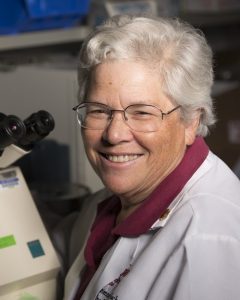
The connection between keto and cancer
Says Scheck, (pictured above) “Based on our research, I definitely think someone with a GBM should go on a therapeutic ketogenic diet as soon as possible, in addition to standard therapy. Our pre-clinical research suggests it potentiates radiation and chemotherapy, and can enhance the anti-tumour immune response. Even ketones alone can have this effect in cell culture. Fighting Brain Cancer with Fats !
There is nothing to lose by trying it.”
So far, Scheck has not heard from the McCain family, likely, she feels, because they are being inundated with all forms
of advice and because many people, including physicians, wrongly lump the ketogenic diet in with “fad” diets that have no scientific basis. But Scheck stresses the ketogenic diet for cancer is no fad. “This is not a ‘diet’ in the typical sense of the word. It is a regimented metabolic therapy with quite a bit of peer-reviewed science behind,” she says.
In fact, Scheck not only has conducted a number of promising studies in mouse models of the disease, she is the principal investigator of a current clinical trial with GBM patients, using the ketogenic diet plus radiation and chemotherapy. The clinical trial has two goals: to show that patients can tolerate the diet and maintain low blood glucose and high blood ketone levels; and to see if patient survival is prolonged.
Scheck’s study is one of 10 clinical trials registered at clinicaltrials.gov, now studying the role of the ketogenic diet in the treatment of glioblastoma, eight of which are still actively recruiting. The studies are being led by teams in three other US locations as well as China, Germany, and the UK.
Taking into account other types of cancer — including lung, breast, pancreatic, prostate and melanoma — a total of 23 clinical trials are currently registered at clinicaltrials.gov that are investigating the ketogenic diet as an adjunct to standard cancer therapy. Over the last decade, research investigating the ketogenic’s diet role in basic cancer research and in emerging therapies has burgeoned, with more than 170 studies or theoretical papers currently in the research literature. The number is increasing each month.
How carbs can fuel cancer
At the heart of argument for using the ketogenic diet to help combat cancer is the fact that cancers need glucose — a great deal of it — to fuel their rapid growth. In fact, that is precisely how a PET scan is used to diagnose cancer: an injection of radioactive sugar lights up the malignant cancer cells because they use glucose at a much higher rate than normal cells. Glutamine, which is an amino acid created from the breakdown of proteins, can also fuel cancer growth.
Starving cancer cells of the glucose and glutamine they need to grow, and using ketones instead as fuel for our cells is the conceptual theory behind the ketogenic diet as an adjunct to cancer treatment. “Normal cells have the flexibility to switch to ketones for energy, cancer cells do not,” explains Dr. Thomas Seyfried, PhD, who is a professor of biology at Boston College (pictured below).
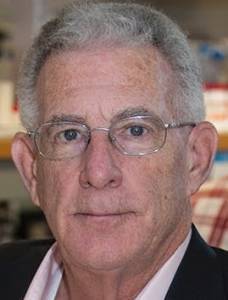 Seyfried is the author of the influential 2012 book Cancer as a Metabolic Disease. In that book, as well as in recent research papers, Seyfried sets out evidence that cancer is a disturbance of cellular energy metabolism, particularly linked to abnormalities in the structure and function of the mitochondria.
Seyfried is the author of the influential 2012 book Cancer as a Metabolic Disease. In that book, as well as in recent research papers, Seyfried sets out evidence that cancer is a disturbance of cellular energy metabolism, particularly linked to abnormalities in the structure and function of the mitochondria.
In a 2015 paper, Seyfried and his colleagues specifically promote using metabolic cancer therapy —i.e the ketogenic diet — as a treatment for glioblastoma. “The goal is to restrict GBM cells of glucose, their main energy substrate,” says Seyfried.
This chronic starvation of the fuel they need to grow, stresses and weakens the cancer cells, and if not killing them outright, makes them much more vulnerable to treatments such as radiation, chemotherapy drugs or hyperbaric oxygen. “It is like a one-two punch, stressing them with starvation by ketones, then hitting them while they are down,” said Seyfried.
This one-two punch concept —which Seyfried and his colleagues call “Press-Pulse” theory, was recently detailed in their February 2017 paper. The conceptual framework is to stress the cancer by starving it of glucose and suppressing insulin signaling (the press), then making a sudden strike with hyperbaric oxygen and metabolic-based drugs or milder doses of chemotherapeutic drugs and radiation (the pulse.)
Dr. Dominic D’Agostino, top keto researcher, teaches you how to get into ketosis… and why you may want it. “Denying cancer cells glucose is like taking the foot off the gas pedal,” explains co-author Dominic D’Agostino, an associate professor of molecular pharmacology and physiology at the University of South Florida and a research scientist at the Institute for Human and Machine Cognition. D’Agostino’s extensive research on the ketogenic diet has been featured in several Diet Doctor videos (see right and below).
D’Agostino decade-long research has been focused on nutritional neuroscience — how the brain changes in response to dietary influences. He started by studying the ability of the ketogenic diet and ketone supplementation. . . . to help prevent seizures associated with central nervous system oxygen toxicity, a limitation of US Navy SEAL divers who use recircuit breathers.
D’Agostino says their hypothesis is that glucose, insulin, and inflammation are all closely linked to cancer growth and to cancer treatment and prevention; they are tightly associated with the metabolic health of cells “While the current dominant theory of cancer’s origins are that it arises through mutations in cellular DNA, the stability of DNA is also strongly correlated to the functioning of the mitochondria and oxidative stress,” D’ Agostino says.
“Nutritional ketosis with periodic fasting supports healthy mitochondrial functioning, autophagy (cellular recycling), suppression of oxidative stress, suppression of insulin signaling and reduction in specific pro-inflammatory pathways.” D’Agostino stresses that research on the ketogenic diet and cancer is still in its infancy. “We need more clinical data about how best to apply these concepts to the patient with GBM,” he cautions. “However, it is very reasonable for someone with a diagnosis of GBM —with an average 12-18 months to live — to implement a ketogenic diet (with a qualified nutritionist) to their standard therapy.”
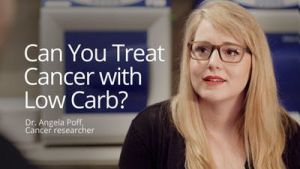 Now his lab, specifically with research associate Dr. Angela Poff, is investigating the role of nutritional ketosis as an adjuvant in cancer therapy. Dr. Poff’s video about exploiting cancer metabolism using ketosis is a popular video on the Diet Doctor site.
Now his lab, specifically with research associate Dr. Angela Poff, is investigating the role of nutritional ketosis as an adjuvant in cancer therapy. Dr. Poff’s video about exploiting cancer metabolism using ketosis is a popular video on the Diet Doctor site.
Dr. Dominic D´Agostino has done a considerable amount of work on Calorie Restriction, fasting and the Ketogenic Diet. He confirmed that fasting or carbohydrate restriction per se will reduce levels of blood glucose, insulin and IGF-1, all implicated in the cancer development process. Indeed, the body goes into a state of ketosis when you fast for three days – that is, healthy cells cannot burn glucose so they turn to stored fat. Cancer cells cannot use fat as a fuel.
However, there´s a ´but´ with really short-term fasting such as Intermittent fasting or one day fasts. When you have your next meal containing carbohydrates, the glucose and hormone levels will spike. This causes mood swings and the spikes can still aid cellular inflammation and cancer development.
And while we talk about the Ketogenic diet below, there is really little hard evidence to suggest it is better for you with chemo- and radiotherapy than calorie restriction, or fasting, and for most people with cancer, a straight forward, no-empty-glucose/fructose, good fat biased Rainbow Diet. https://www.canceractive.com/cancer-active-page-link.aspx?n=3408
Dr. Nasha Winters wrote a book called: The Metabolic Approach to Cancer: Integrating Deep Nutrition, the Ketogenic Diet, and Nontoxic Bio-Individualized Therapies. It’s a decently long, but easy read.
Keto Diet & Brain Tumors videos
For those who say they haven’t ‘felt’ good while on the regular keto diet, I also have a few questions for you. Are you: tracking your macros, hitting your goals, keeping your electrolytes (salt, magnesium, potassium) in check, exercising, still having cheat meals, testing BLOOD ketones (NOT URINE), eating too much protein, eating enough fat? There is quite a bit more, but this is a bit off topic already.
Stories of controlling brain cancer with keto!!! https://www.facebook.com/TheKetoKatie/
Pablo Kelly, 28, from Devon, U.K., couldn’t agree more.
He was diagnosed with GBM in 2014 and credits the ketogenic diet with saving his life. “My GBM was declared inoperable because of its location in my brain, in the parietal lobe, with a tendril going into my motor cortex,” said Kelly, who soon after the diagnosis began a restricted calorie ketogenic diet.
He credits his three years of strict keto eating, as well as supplementing with exogenous ketones, MCT oil and anti-inflammatory supplements, with shrinking his tumour enough so that 90 % could be removed by an awake craniotomy earlier this year. A MRI scan in May shows the cancer has not grown, says Kelly, who connects with people through his open Facebook page, Pablos Journey Through a Brain Tumour, and through media stories, which have been shared by thousands.
“Three years ago I had to search really hard to find people who were doing ketogenic for GBM,” says Kelly who these days is regularly contacted by people around the world hoping for more information and help to try keto for their brain tumor. “I want to inspire as many people as possible.”
If you are given the cancer diagnosis. It shuts you down and makes you feel completely alone. They give you the cold hard facts and they are cold and hard!
Yet you are just sat there thinking to yourself, “am I going to die?”, “what can I do?”, “will this change me forever?” and “how does this make my loved ones feel?”…
That or you are just completely empty of thought and you feel cold and lifeless. Nothing matters anymore. This is your life and its being taken away from you. Everything’s going to change and there seems to be nothing you can do to stop it from happening.
The truth is, that is wrong. There is always a solution to a problem. You just have to look for it. Don’t give in to your fear of death. Don’t let the fight go out of you. Believe in your ability to heal. Cancer is like a wound. It will heal. Given the right environment and attention.
I chose to research and research well into the night, into the wee hours of the morning. I researched ways of combating a terminal and inoperable high grade brain tumour and ways of dealing with it in a nutritional manner. I stumbled upon a diet aimed at children with epilepsy and it showed that it was also an anti-inflammatory diet. A brain tumour is a form of edema (swelling). I thought to myself this could help, this could be an answer to my problem! http://yestolifecharity.blogspot.com/2015/11/pablos-journey-through-brain-tumour.html
As advised by my oncologist, I was going to do chemotherapy and radiotherapy. Which are the two most prolific methods of dealing with cancer of any form. I had radiotherapy mask molded to the shape of my face. I went into the room to have my practice run, but something deep in my gut told me to ask a question. I asked the nurse to let me call the oncologist to ask some questions.
So I asked her, “is this going to cure me?”, the answer was probably not. It would only give me 12-15 months at best, but would then most likely be ineffective. This was all I needed to make my penultimate decision. I was not going to go through with orthodox treatment. I was going to put every fibre of my being into also the ketogenic diet and supplementation.
It was very effective and within months my MRI scan showed no progression in the growth of the tumour. I kept having stable scans for over 2 years when it started to show signs of growing, but may I add, quite slowly. Glioblastoma multiforme brain tumours are very fast growing tumours. Mine was not growing fast.
Then in the winter of 2016 they told me my tumour had changed shape and that a surgeon believed they could perform an awake craniotomy to debulk the tumour.
By March 2017 I had my operation and they removed 90% of the deadly tumour from my brain and by May there was no new growth. I kept having 3 monthly scans to check on my progress post op and my scans kept coming back stable until, in September, I had an appointment to see the oncologist. I will cut to the chase. To put it simply, my tumour was no longer visible. Clear!
Finally after 3 years of hard work and struggling with epilepsy and fatigue and emotions. I had successfully prolonged my life through diet and nutrition. I believe in my ability to heal and I just wanted to share my story to inspire you to look beyond your fear and live honestly and with love. Pablo Isaiah Kelly.
Canadian teenager Adam Sorenson’s (pictured to the right together with his father Brad.)
9 journey with GBM and the ketogenic diet is another inspiring anecdotal story. He was diagnosed with Stage IV GBM in September 2013, the day after his 13th birthday. The tumor was the size of a baseball and uniformly fatal.
Doctors performed surgery to remove as much as possible, but his father, Brad, did extensive research to try to improve his son’s odds for survival. “The overriding rules I set was that it had to be safe, it had to have at least some clinical trial data published, and it had to be accessible.”
His parents consulted with Dr. Jong Rho, an expert in the ketogenic diet for epilepsy, and a former mentor of Dr. Scheck at the Barrow Neurological Institute who had been also recruited to the Alberta Children’s Hospital to the Hotchkiss Brain Institute at the University of Calgary.
The Sorensons also consulted with Drs. Seyfried, D’Agostino and Scheck.
The low-carb, high-fat ketogenic diet can be an effective tool to manage malignant brain cancer, said scientist Dr. Adrienne C. Scheck.
They came up with a protocol that included a ketogenic diet consisting of 80% fat, 15% protein and 5% carbohydrates combined with radiation treatment, hyperbaric oxygen, and the drug metformin. Four months after starting the treatment, Adam had an MRI scan in February of 2014 that showed no visible tumor. Thirteen subsequent MRIs to this day have remained clear of cancer. Adam has remained on the ketogenic diet and metformin ever since. “It is basically really low carbs with lots of whipping cream, eggs, pork, nuts and seeds,” says his dad.
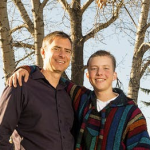 In a compelling video, Adam says the diet is not always easy as a teenager, especially when out with friends. “When I realized I was not going to be able to eat some of my favorite foods like pizza and candy, I was a little sad. But I thought, it’s going to help me live.”
In a compelling video, Adam says the diet is not always easy as a teenager, especially when out with friends. “When I realized I was not going to be able to eat some of my favorite foods like pizza and candy, I was a little sad. But I thought, it’s going to help me live.”
Adam was a keynote speaker last November at the Global Symposium on Ketogenic Therapies, held in Banff Alberta and sponsored by the Charlie Foundation for Ketogenic Therapies. The foundation began as an organization focused on ketogenic diet for epilepsy control, but has now branched into its use in brain cancer, autism and other cognitive disorders.
When asked what he would say to families dealing with GBM, Brad Sorenson said, “I am really hesitant to act as the role of a doctor. I am concerned that I could add to a stressful situation. I don’t want to give them false hope.”
Sorenson, who is the CEO and founder of two biotechnology companies notes however, that the keto diet seems to be most effective when started before radiation and that steroids, which are almost uniformly given to brain cancer patients, can interfere with effective ketosis. “Adam’s protocol invites a lot of pushback from doctors.” So Sorenson simply tells people what they did for Adam, shares a slide deck with their protocol and its rationale with references, and encourages them to find a qualified dietitian.
“I do not believe the diet alone is a game changer but I do believe it helps improve the potency and efficacy of other cancer treatments,” says Brad. “I am very aware that Adam’s story is anecdotal. But I am totally confident that if we had gone with the standard of care, Adam would not be alive today.” — Anne Mullens
Disclaimer: I am not a doctor, dietitian, or physician.
I’d like to reiterate a comment earlier in this thread: there is a difference between, low carb high fat, lazy keto, keto and therapeutic keto. The type of ketogenic diet recommended to cancer patients is therapeutic keto.
This involves a little more than your usual 75% fat, 20% protein and 5 % carbs. You are tracking your blood glucose and your blood ketones while trying to bring the blood ketone levels into a therapeutic state. This ratio is called the: GKI, or Glucose and Ketone Index. I have attached a link better explaining it and the calculation. Getting your blood glucose levels down is a significant part of this process.
Woman battles deadly brain cancer using low carb ketogenic diet without chemo by Samantha Chang
 Alix Hayden has brain cancer, but instead of undergoing surgery and grueling chemotherapy, she’s fighting it with the low-carb, high-fat ketogenic diet and has been doing great so far. In an exclusive interview 0n March 14, Hayden discussed her metabolic diet therapy and navigating cancer with a positive attitude. Alix, is also director of operations at a biochemistry research firm Phenomenome Discoveries in Saskatoon, Canada, was diagnosed with brain cancer in August 2012.
Alix Hayden has brain cancer, but instead of undergoing surgery and grueling chemotherapy, she’s fighting it with the low-carb, high-fat ketogenic diet and has been doing great so far. In an exclusive interview 0n March 14, Hayden discussed her metabolic diet therapy and navigating cancer with a positive attitude. Alix, is also director of operations at a biochemistry research firm Phenomenome Discoveries in Saskatoon, Canada, was diagnosed with brain cancer in August 2012.
She has been following the ketogenic diet (which is a very low-carb, high-fat, moderate-protein diet) since February 2013, which also cancer researcher Dr. Dominic D’Agostino confirmed starves cancer cells. This is because all the cells in our body. . .can use both fat and glucose (a carb), however, cancer cells thrive on glucose and can’t survive on ketones.
So by limiting carbohydrates — which turns into glucose inside the body — we can starve cancer cells.Hayden’s diet is roughly 65% fats, 30% protein, and 5% carbs. Her brain tumor hasn’t gotten smaller since she began the ketogenic diet, but it also hasn’t gotten any bigger — which is a great sign.
Alix, who’s in her thirties, gets an MRI every six months and is holding off on chemotherapy and radiation, as her brain tumor was categorized as slow-growing. Hayden started a blog called Greymadder to chronicle her cancer recovery, which has made her something of an Internet celebrity.
How the Ketogenic Diet Weakens Cancer Cells
thetruthaboutcancer.com › Cancer Prevention
(This source of fuel is capable of crossing the blood brain barrier.)
In Memory of Dan Thobe – Search (bing.com) 

Fight Like Hell, ‘‘‘Play Strong, Stay Strong, Super Strong.’”


